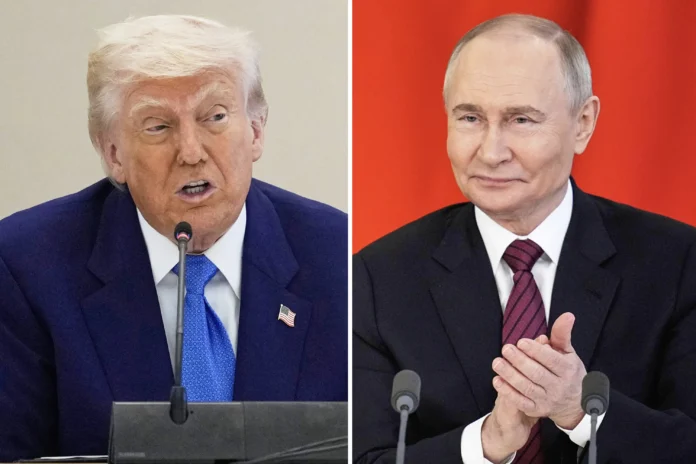Russian President Vladimir Putin told U.S. President Donald Trump in a recent phone call that Russia will not give up its mission to eliminate what it sees as the “root causes” of the war in Ukraine. However, he also expressed willingness to find a political and negotiated solution.
The one-hour phone call between the two leaders took place on Thursday. Kremlin adviser Yuri Ushakov said Putin remains firm in Russia’s goals but is also ready to continue political discussions. “Russia will not back down,” Ushakov stated, while noting that Putin is still open to diplomacy.
The Kremlin’s idea of “root causes” refers to its belief that the war was necessary to stop Ukraine from joining NATO and becoming a military threat to Russia. This view has been strongly rejected by Ukraine and its Western allies, though Trump has shown partial agreement with that argument.
Following the call, Trump said he was disappointed by the lack of progress in securing a ceasefire. He admitted, “I made no progress” and added that he is “not happy” about the ongoing war in Ukraine.
This was the sixth phone conversation between Trump and Putin since Trump began his second term in January. The timing of the call is notable—it happened a day after the U.S. Pentagon announced that it would pause some weapons deliveries to Ukraine. These included important air defense missiles and precision-guided artillery that had been promised during Joe Biden’s presidency.
However, the Kremlin said the topic of the paused weapons shipments did not come up during the call. Instead, Trump focused on asking Putin to help bring the war to an end quickly. There was no discussion about a future face-to-face meeting, but both leaders agreed to keep communication open.
So far, Trump has tried to act as a mediator in the Ukraine conflict but has not achieved any real results. Russia continues to reject U.S. proposals for a ceasefire without conditions, despite Ukraine’s support for such plans. The Kremlin made it clear that if any peace talks were to happen, they must be directly between Russia and Ukraine—not involving the U.S. as a primary negotiator.
There are signs that Russia is avoiding three-party talks. Ukrainian officials said that during a meeting in Istanbul last month, Russian negotiators asked U.S. diplomats to leave the room. This has raised concerns about Russia’s commitment to broader diplomatic efforts.
During their previous call in mid-June, Putin had offered to help mediate during a brief 12-day conflict between Iran and Israel. Trump rejected the offer and said his priority was resolving the Ukraine war, telling Putin, “No, I don’t need help with Iran. I need help with you.”
On the topic of Iran, Putin said on Thursday that all disputes involving Iran should be solved through diplomatic channels. This comment came after the U.S. bombed three of Iran’s nuclear facilities last month, an action that Russia condemned as illegal.
Meanwhile, Ukrainian President Volodymyr Zelenskyy met with European Union leaders in Denmark the same day. He emphasized the growing need for stronger ties with the EU and NATO, especially as doubts grow over U.S. military support. Zelenskyy said he hoped to speak with Trump on Friday to discuss the paused weapons shipments.
Trump has generally opposed Ukraine’s attempt to join NATO, a move that Kyiv views as crucial for its long-term security.
In summary, the latest call between Trump and Putin shows no major breakthrough. Russia remains firm in its military goals but continues to leave the door open for diplomacy. The U.S. and Ukraine, meanwhile, face new challenges as American military aid comes under review.


